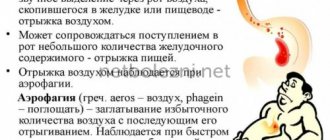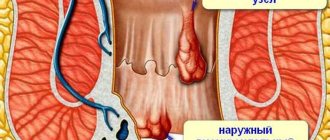The article was prepared by a specialist for informational purposes only. We urge you not to self-medicate. When the first symptoms appear, consult a doctor.
Belching air is an involuntary sudden release of odorless gases from the stomach or esophagus through the mouth.
Normally, each swallowing movement is accompanied by the ingestion of a small amount of air (within 2-3 ml), which is necessary to normalize intragastric pressure. Subsequently, the air quietly escapes through the mouth in small portions.
Noticeable belching of air occurs when excessive penetration of air into the stomach during the absorption of food, and in some cases, outside of this process. This phenomenon may indicate the presence of gastric pneumatosis or aerophagia.
With normal functioning of the stomach, such belching is not accompanied by any unpleasant sensations, since the air coming out of it has neither smell nor taste.
Separately, it is worth paying attention to neurotic aerophagia, which is characterized by swallowing air outside of food consumption. In this case, belching of air can occur both after eating and at any other time, with the exception of sleep. This is already a pathological syndrome that requires the attention of a specialist.
Causes of belching air
To understand the reasons that contribute to belching, you need to understand how the digestive system works. Food entering the oral cavity passes through the esophagus and enters the stomach. If a person overeats, the air present in the stomach comes out. This is a variant of the norm and only confirms that the organs of the digestive system work harmoniously. Therefore, if after a heavy lunch or dinner a person belches with ordinary, odorless air, this is not a cause for any concern.
Sometimes belching occurs during physical training, when the contents of the stomach quickly move inside its cavity, which provokes the release of air out,
Belching can also occur due to the fact that a person wears too tight trousers or belts. This prevents the stomach from expanding normally. Therefore, the organ independently gets rid of the air inside. Most often, a similar situation is observed in people who are prone to obesity. Normally, after some time after eating, belching stops bothering you.
As a rule, all the reasons described above lead to the fact that belching occurs rarely. However, sometimes she begins to literally chase a person. The reasons for this violation can be very diverse, and understanding them is not always easy.
Pregnant women, especially in the 2nd and 3rd trimester of pregnancy, may suffer from belching. This does not indicate the development of any pathology. Everything is explained by physiological reasons. During pregnancy, the uterus increases in size, begins to put pressure on the diaphragm and pushes the air in the stomach out.
Frequent, causeless belching that occurs on an empty stomach is a cause for concern. If the air coming out of the stomach has an unpleasant smell, such as rotten eggs, or a sour or bitter taste appears in the mouth, then this becomes a serious cause for concern. Such belching most often indicates diseases of the digestive system.
However, do not panic ahead of time. A comprehensive examination is necessary, since belching, accompanied by the unpleasant symptoms described above, may indicate improper intake of foods. The term aerophagia is not familiar to everyone. It involves swallowing large amounts of air while eating. This can happen when a person eats very quickly, does not chew food, or eats “on the go.” Also, talking while eating, frequent use of chewing gum, wearing dentures that are inappropriate in size or structure, smoking, inhalations carried out for medicinal purposes, and too deep breathing can lead to the entry of large amounts of air into the stomach. All these reasons can lead to belching that is not associated with food intake. Air will enter from the stomach simply because there is too much of it there.
There are foods and drinks that can cause excess air to enter the stomach. This is especially true for soda. It contains carbon dioxide in dissolved form. After it enters the stomach, this gas accumulates there and tries to come out naturally.
The following can also be considered belching provoking foods:
- Fatty dishes.
- Garlic and onion.
- Legumes.
- Strong brewed coffee and tea.
To get rid of belching caused by the “wrong” foods, you just need to eliminate them from your diet.
You need to be concerned about your own health when belching occurs frequently and is accompanied by the following symptoms:
- Feeling of heaviness in the stomach area.
- Nausea.
- Heartburn.
- Pain in the upper abdomen.
Such belching can be a signal of various diseases affecting the organs of the digestive system, for example:
- Gastritis.
- Peptic ulcer disease.
- Inflammation of the pancreas.
- Gastroduodenitis and duodenitis.
- Inflammatory phenomena in the esophagus.
- Esophageal hernia.
- Weak sphincter between the esophagus and stomach.
- Traumatic injuries to the mucous membrane of the digestive system.
- Gastroesophageal reflux.
- Cancerous lesions of the digestive system.
Aerophagia (swallowing air)
Aerophagia
(eng.
aerophagia
) - swallowing air. Every time a person swallows something, a small amount of air enters the stomach. This gas from the stomach usually passes into the small intestine, where some of it is absorbed. The rest of the gas passes into the colon and exits through the anus. Some of the gas comes out through the mouth when belching.
The cause of increased air swallowing may be:
- swallowing large volumes of air during stress or nervous tension
- frequent swallowing of air by some people due to chewing gum or smoking
- hasty eating
- poorly fitted dentures
- frequent swallowing due to either constant drainage of mucus from the nasal cavity down the back of the throat (postnasal drip) or instillation of drops into the nose
Aerophagia as a functional gastrointestinal disorder
In the Rome III criteria for functional gastrointestinal disorders (2006), aerophagia is classified as a gastroduodenal disorder.
Aerophagia is understood as disturbing patient episodes of repeated belching, occurring several times a week, accompanied by objective signs of swallowing air and observed over the past 3 months with a total duration of complaints of at least 6 months. Nonspecific excessive belching differs from aerophagia in the absence of objective signs of swallowing air. It can be combined with functional dyspepsia, occurring against the background of increased sensitivity of the stomach wall to stretching (Ivashkin V.T. et al.). In category H “Functional disorders: children and adolescents (from 4 to 18 years),” aerophagia is included in the subcategory “H1 Vomiting and aerophagia” and has the code H1c (Erdes S.I. et al.). Aerophagia can cause pain behind the sternum with a feeling of fullness in the epigastrium and lack of air, which goes away after belching (Golochevskaya V.S.).
Moderate aerophagia is often observed in children in the first months of life due to the immaturity of the nervous regulation of the swallowing process.
Aerophagia is classified as a psychological disease not associated with gastroesophageal reflux disease (Valitova E.R., Bor S.).
Recommendations for the treatment of aerophagia
Treatment of aerophagia is carried out in accordance with the general principles of the treatment of functional disorders and involves, first of all, eliminating the root cause, which often requires the involvement of a neurologist, psychologist or neuropsychiatrist (Belmer S.V. et al.).
To reduce aerophagia, it is recommended to remain silent and not rush while eating (Maev I.V., Kucheryavyi Yu.A.). Among medications, antifoaming and carminative agents are used, such as simethicone (Espumizan), dimethicone and others.
To avoid aerophagia in infants, it is recommended to keep them at an angle of 45-60 degrees when feeding (Privorotsky V.F., Luppova N.E.).
Gas bolus. pH-impedancemetry
The volume of air (or other gas) moving down the esophagus (during swallowing) or upward (during belching) is called a gas bolus. If a gas moves together, for example, with a liquid, then it is mixed. The most informative instrumental study of aerophagia is impedance pH-metry, which will determine the passage of various boluses through the esophagus, the direction of their movement and type.
Swallowing large amounts of air during meals (intraesophageal impedancesomer) (Bordin D.S. et al.)
By changing the scale of the graph, you can clearly assess the antegrade nature of air intake (with a gulp) (Bordin D.S. et al.)
Using impedance pH-metry, it was possible to determine that in some patients with aerophagia, the swallowed air does not reach the stomach, but once it enters the esophagus, it returns back in the form of a belch within about one second. Such belching is not a manifestation of insufficiency of the lower esophageal sphincter and is called “supragastric belching” (Kaibysheva V.O. et al.) or “supragastric gas reflux” (Valitova E.R., Bor S.).
Patient Materials
Articles:
- 10 ACG tips for belching, bloating, flatulence
- Gases in the digestive tract
- Belching
- Vasilenko V.V. About belching and periodic vomiting
The GastroScan.ru website also contains materials for patients on various aspects of gastroenterology:
- “Advice from doctors” in the “Patients” section of the site
- “Popular gastroenterology” in the “Literature” section
- “Popular gastroenterology” in the “Video” section
Resources for healthcare professionals regarding aerophagia
Printed materials
- Woodley FW, Ciciora SL, Vaz K, Williams K, Di Lorenzo C. Should all a symptomatic infants under the age of 12 months undergoing impedance testing be assessed for aerophagia? Abstracts of the 19th American Neurogastroenterology and Motility Society Annual Scientific Meeting August 13–15, 2022, Boston, Massachusetts, USA. No. 97. Neurogastroenterology & Motility. 2021;33(Suppl. 1):e14230. P. 43-44. Translating to Russian language
. - Belmer S.V., Khavkin A.I., Pechkurov D.V. Functional disorders manifested by vomiting in older children / In the book. Functional disorders of the digestive system in children. Principles of diagnosis and treatment. M.: GEOTAR-Media. 2022. pp. 25-30..
On the GastroScan.ru website in the “Literature” section there are subsections “Pediatric gastroenterology”, “Refluxes, regurgitation, regurgitation in children” and “Impedance pH-metry”, containing publications for healthcare professionals on this topic.
Video for pediatricians
Still from video Mukhametova E.M., Ipatova M.G. Functional disorders of the upper gastrointestinal tract in children: what, where, when?
Note. MII - Multichannel Intraluminal Impedance (multichannel intracavitary impedancemetry)
On the website GastroScan.ru in the “Video” section there are subsections “For doctors” and “For pediatricians”, containing video recordings of reports, lectures, webinars in various areas of gastroenterology for healthcare professionals.
Back to section
Belching air after eating
With normal functioning of the human gastrointestinal tract, belching of air after eating appears irregularly and rarely. This phenomenon may occur due to excessive swallowing of air during food consumption.
This happens if:
- eat food too quickly;
- have trouble chewing food;
- eat on the go.
Belching after eating also appears:
- when drinking gas-containing drinks, very hot or cold food;
- due to the habit of talking while eating;
- under stress.
As a result, the swallowed air forms a large air bubble, which puts pressure on the walls of the stomach. Our body, as a balanced mechanism, must take measures to lower blood pressure. And it does this by opening the cardiac sphincter between the stomach and esophagus. Excess air from the stomach enters the esophagus, then into the oral cavity, then belching occurs.
Causes of belching
Physiological, that is, not related to the disease:
- full stomach, overeating;
- drinking carbonated drinks;
- eating poor quality or spicy food;
- physical activity immediately after eating.
Pathological, that is, a symptom of a disease:
- inflammatory diseases of the stomach or esophagus;
- liver and gallbladder diseases;
- ulcerative or erosive defects of the esophagus and/or stomach;
- benign (polyps) and malignant tumors of the esophagus and/or stomach;
- hiatal hernia;
- impaired motility of the esophagus and/or stomach, including central (in case of central nervous system pathology) origin.
Constant belching of air
Repeated belching of air can occur as a result of systematic violation of the rules of food intake, but in some cases, it can also be considered as a pathological symptom indicating the development of neurotic aerophagia.
Causes of the disease:
- difficulty breathing through the nose;
- diseases of the oral cavity and teeth;
- frequent swallowing of saliva due to excessive salivation.
Frequent swallowing of air not during food intake is characteristic of a pathological conditioned reflex (neurosis).
In addition, aerophagia can develop with:
- chronic gastritis;
- disorder of gastric tone and motility;
- pyloroduodenal stenosis;
- peptic ulcer disease (especially in the case of a high location of the ulcerative lesion);
- cardiovascular failure;
- cardiospasm;
- narrowing of the esophagus;
- aneurysm of the descending aorta.
The clinical picture is as follows:
- There is a constant loud, sometimes “multi-story”, belching of air, and in people suffering from hysteria, it can be accompanied by a loud scream.
- Belching occurs after eating, and at any other time, and sometimes it occurs almost constantly and disappears during sleep.
- Complaints of sensations of fullness and heaviness, which are most often localized in the epigastric region.
Abdominal bloating is observed, in severe cases quite significant, reminiscent of the picture characteristic of intestinal obstruction.
- People with coronary heart disease may experience pain in the heart area with attacks of angina.
- Less commonly, difficulty breathing occurs, including attacks of suffocation.
Experts note that often a typical belching of air is observed in the patient immediately upon examination, which disappears if his attention is diverted. The doctor may observe the patient preparing to swallow air. He pulls his head forward, his chin presses to his chest, then he begins to swallow. With aerophagia, there is bloating in the upper half of the abdomen. And the x-ray determines the high position of the diaphragm, especially its left dome due to the enlarged air bubble of the stomach and a large accumulation of gases in the intestines.
Newborns and infants can suffer from aerophagia. In some cases, the child’s nervous system cannot cope with the regulation of the digestive apparatus. The disease can also develop due to sucking on a small breast or an empty nipple, which increases the amount of air swallowed.
The main signs of aerophagia in children:
- crying while eating;
- rapid bloating;
- refusal of food and, as a result, weight loss.
When changing position or on their own, the baby may burp air, then calm down and start sucking again. The diagnosis can be confirmed by X-ray examination. Some children get used to swallowing air; you can wean your child off this habit by strictly regulating food intake. Aerophagia in children is associated, for the most part, with general neuropathy or imperfect nervous regulation of the digestive organs, and it goes away with age.
Stomach pain and belching of air
Painful sensations in the stomach with belching of air may indicate a disease, be its harbingers or the consequences of improper nutrition.
Similar problems may arise due to:
- Smoking after eating.
Most smokers reach for a cigarette after finishing a meal, but according to recent research, one cigarette smoked after a meal is equal to ten. During the smoking process, air and smoke are swallowed, which leads to belching with stomach pain.
- Eating fruits.
Many people prefer to eat fruit for dessert - this is wrong. Fruits should be eaten before or after meals 1-2 hours before. Otherwise, the organic acids contained in fruits interact with minerals that are present in other products and affect the process of digestion and absorption of food.
- Tea party.
You should not drink tea after meals, as the enzymes contained in tea leaves “weight” the proteins in food, preventing normal digestion.
- Taking a bath.
This procedure, pleasant and beneficial for the body and soul, should not be performed after a meal, since the increase in blood flow in the extremities correspondingly reduces the blood flow in the stomach area, weakening the digestive system and causing pain in the stomach and belching.
- Loose belt.
The habit of unfastening your belt after eating has a negative impact on bowel function and can cause severe pain with belching.
- Cold drinks.
Drinking cold liquids immediately after meals interferes with normal stomach fermentation and lipid absorption.
- Sleep after eating.
Many people “sin” with the weakness of taking a nap “after a delicious lunch” when there is such an opportunity. But in a dream, proper digestion is simply impossible. As a result, you can get the above symptoms, which can become harbingers of gastroenterocolitis.
Note that the range of diseases that are characterized by pain in the abdominal area and empty belching is quite wide. Therefore, you should not delay solving this problem and seek advice from a gastroenterologist.









